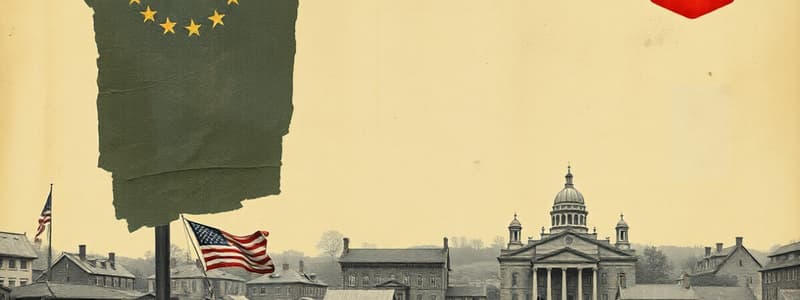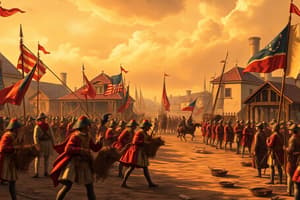Podcast
Questions and Answers
What was the primary requirement of the Quartering Act?
What was the primary requirement of the Quartering Act?
- Colonists had to organize the First Continental Congress
- Colonists were required to provide housing for British troops (correct)
- Colonists had to pay taxes on tea
- Colonists needed to purchase stamps for legal documents
Colonists responded to the Stamp Act by directly dumping stamps in the harbor.
Colonists responded to the Stamp Act by directly dumping stamps in the harbor.
False (B)
What did the Treaty of Paris force the British to acknowledge?
What did the Treaty of Paris force the British to acknowledge?
- The independence of the colonies (correct)
- The end of all military conflicts
- A new territorial expansion
- The continuation of British control over the colonies
What was the consequence of the colonists' reaction to the Tea Act?
What was the consequence of the colonists' reaction to the Tea Act?
The Treaty of Paris ensured that Loyalist property would be returned to its rightful owners.
The Treaty of Paris ensured that Loyalist property would be returned to its rightful owners.
Thomas Paine's pamphlet, __________, encouraged American colonists to rebel against British rule.
Thomas Paine's pamphlet, __________, encouraged American colonists to rebel against British rule.
Match each British policy with its corresponding colonist reaction:
Match each British policy with its corresponding colonist reaction:
What did Americans agree to do regarding Loyalist property after the Treaty of Paris?
What did Americans agree to do regarding Loyalist property after the Treaty of Paris?
The Treaty of Paris forced the British to accept the independence of the ______.
The Treaty of Paris forced the British to accept the independence of the ______.
Match the following terms with their descriptions:
Match the following terms with their descriptions:
What was one significant outcome of the Boston Massacre?
What was one significant outcome of the Boston Massacre?
The Boston Massacre resulted in the death of only 3 Bostonians.
The Boston Massacre resulted in the death of only 3 Bostonians.
What was the primary purpose of Thomas Paine's Common Sense?
What was the primary purpose of Thomas Paine's Common Sense?
The Boston Massacre led to an increase in ______ sentiment among American colonists.
The Boston Massacre led to an increase in ______ sentiment among American colonists.
Match the events with their impacts:
Match the events with their impacts:
What requirement did the Quartering Act place on the colonists?
What requirement did the Quartering Act place on the colonists?
The Tea Act allowed colonists to freely import tea from non-British sources.
The Tea Act allowed colonists to freely import tea from non-British sources.
What action did colonists take during the Boston Tea Party?
What action did colonists take during the Boston Tea Party?
Colonists were required to buy ________ to put on legal documents due to the Stamp Act.
Colonists were required to buy ________ to put on legal documents due to the Stamp Act.
Match the colonial reactions to the corresponding British policies:
Match the colonial reactions to the corresponding British policies:
Which British policy established a monopoly on tea?
Which British policy established a monopoly on tea?
The Stamp Act was successfully upheld by colonists without any protests.
The Stamp Act was successfully upheld by colonists without any protests.
What event is referred to as 'The Shot Heard 'Round the World'?
What event is referred to as 'The Shot Heard 'Round the World'?
The Battle of Saratoga was significant because it marked the end of the American Revolution.
The Battle of Saratoga was significant because it marked the end of the American Revolution.
What was the significance of the battles of Trenton and Princeton for American troops?
What was the significance of the battles of Trenton and Princeton for American troops?
The Battle of ________ was the final battle of the American Revolution.
The Battle of ________ was the final battle of the American Revolution.
Match the battles with their significance:
Match the battles with their significance:
Which battle caused France to send military support to the Americans?
Which battle caused France to send military support to the Americans?
The Battle of Yorktown was fought without any French assistance.
The Battle of Yorktown was fought without any French assistance.
What was the impact of the victory at the Battles of Trenton and Princeton?
What was the impact of the victory at the Battles of Trenton and Princeton?
The Battle of ________ is known as the turning point of the war.
The Battle of ________ is known as the turning point of the war.
What was one of the consequences of signing the Declaration of Independence?
What was one of the consequences of signing the Declaration of Independence?
Signing the Declaration of Independence created a new sense of uncertainty about governance among Americans.
Signing the Declaration of Independence created a new sense of uncertainty about governance among Americans.
What risk did the colonists face by signing the Declaration of Independence?
What risk did the colonists face by signing the Declaration of Independence?
One of the effects of signing the Declaration of Independence is that it made Americans think about their new ______ .
One of the effects of signing the Declaration of Independence is that it made Americans think about their new ______ .
Which of the following is NOT a consequence of signing the Declaration of Independence?
Which of the following is NOT a consequence of signing the Declaration of Independence?
The signing of the Declaration of Independence led to a united and stable government immediately.
The signing of the Declaration of Independence led to a united and stable government immediately.
What mindset began to form among Americans as a result of signing the Declaration of Independence?
What mindset began to form among Americans as a result of signing the Declaration of Independence?
Signing the Declaration of Independence meant that the colonists could be accused of ______.
Signing the Declaration of Independence meant that the colonists could be accused of ______.
What is one major risk associated with declaring independence?
What is one major risk associated with declaring independence?
Flashcards
What impact did the Boston Massacre have?
What impact did the Boston Massacre have?
The Boston Massacre, where five Bostonians were killed, fueled strong anti-British feelings among the American colonists.
What was the purpose of Thomas Paine's 'Common Sense'?
What was the purpose of Thomas Paine's 'Common Sense'?
Thomas Paine's "Common Sense" was a powerful pamphlet written to convince the American colonists to fight for independence from Britain.
What was the Quartering Act?
What was the Quartering Act?
The Quartering Act required colonists to provide housing and supplies for British soldiers. This was viewed as a burden by the colonists and contributed to growing tensions with Britain.
What was the Stamp Act?
What was the Stamp Act?
Signup and view all the flashcards
What happened during the Boston Tea Party?
What happened during the Boston Tea Party?
Signup and view all the flashcards
How did colonists resist British policies?
How did colonists resist British policies?
Signup and view all the flashcards
Quartering Act
Quartering Act
Signup and view all the flashcards
Tea Act
Tea Act
Signup and view all the flashcards
Stamp Act
Stamp Act
Signup and view all the flashcards
Colonial Reaction to Quartering Act
Colonial Reaction to Quartering Act
Signup and view all the flashcards
Colonial Reaction to Tea Act
Colonial Reaction to Tea Act
Signup and view all the flashcards
Colonial Reaction to Stamp Act
Colonial Reaction to Stamp Act
Signup and view all the flashcards
Treaty of Paris (1783)
Treaty of Paris (1783)
Signup and view all the flashcards
British Recognition of American Independence
British Recognition of American Independence
Signup and view all the flashcards
Return of Loyalist Property
Return of Loyalist Property
Signup and view all the flashcards
Loyalists
Loyalists
Signup and view all the flashcards
Controversial Return of Loyalist Property
Controversial Return of Loyalist Property
Signup and view all the flashcards
Significance of the Treaty of Paris
Significance of the Treaty of Paris
Signup and view all the flashcards
What significance did the Battle of Lexington and Concord have?
What significance did the Battle of Lexington and Concord have?
Signup and view all the flashcards
What significance did the Battle of Saratoga have?
What significance did the Battle of Saratoga have?
Signup and view all the flashcards
What significance did the Battles of Trenton and Princeton have?
What significance did the Battles of Trenton and Princeton have?
Signup and view all the flashcards
What significance did the Battle of Yorktown have?
What significance did the Battle of Yorktown have?
Signup and view all the flashcards
Declaration of Independence (DOI)
Declaration of Independence (DOI)
Signup and view all the flashcards
Consequences of signing the DOI
Consequences of signing the DOI
Signup and view all the flashcards
Effects of signing the DOI
Effects of signing the DOI
Signup and view all the flashcards
Risks of signing the DOI
Risks of signing the DOI
Signup and view all the flashcards
Treason
Treason
Signup and view all the flashcards
Government
Government
Signup and view all the flashcards
Laws
Laws
Signup and view all the flashcards
Betray
Betray
Signup and view all the flashcards
Colonists
Colonists
Signup and view all the flashcards
Study Notes
Colonial Reactions to British Policies
- The colonists reacted to the British policies in various ways, demonstrating their growing discontent and resistance. Key reactions are outlined below
- The colonists refused to house British soldiers under the Quartering Act and it led to the organisation of the First Continental Congress
- The colonists dumped the tea in the harbor during the Boston Tea Party which directly led to the Stamp Act being repealed.
- Colonial protests against the Stamp Act resulted in the act being repealed.
- These reactions highlight the escalating tensions and the growing desire for self-governance among the colonists.
Studying That Suits You
Use AI to generate personalized quizzes and flashcards to suit your learning preferences.




